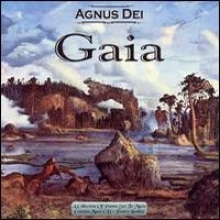MENNO VON BRUCKEN FOCK
GAIA (NL+E)

Onder het pseudoniem Agnus Dei heeft de Oostenrijkse toetsenist Gerald Krampl Gaia opgenomen, zijn vierde en tevens laatste album. De muziek is geïnspireerd op de prachtige gedichten van zijn inmiddels overleden echtgenote Hilde, waardoor dit project moest worden afgesloten. Het is triest dat iemand die zo positief schreef over spirituele meditatie en zaken als Reiki - waarin Krampl overigens ook een master degree heeft - toch kansloos overleed aan kanker en op 46-jarige leeftijd afscheid moest nemen van Gaia, althans fysiek. Ik ben meer een rechttoe-rechtaan type, dus heb ik moeite om me te verplaatsen in de hoogdravende denkwerelden van dergelijke individuen. Wat de muziek betreft, neig ik er toe om het richting lounge of zelfs genereal melodic te classificeren, hoewel Gaia als new age staat gerubriceerd. De dertien nummers zijn alle voorzien van een duidelijke structuur met een kop en een staart en met de piano als voornaamste toetseninstrument, ondersteund door een keur van diverse orkestrale arrangementen. De melodielijnen zijn zeer toegankelijk, maar te energiek om echt onderuitgezakt bij te kunnen wegdromen. Zonder Rick Wakeman naar de kroon te steken, is wel duidelijk dat het hier om een geschoold musicus gaat. Subtiele ritmes soms ondersteund door elektronische percussie en meerdere toetsenlagen waarin onder meer synths, fluitsamples, orgel en accordeon te horen zijn, maken dit album alleszins de moeite van het beluisteren waard. Naast het new age pianowerk van Wakeman, zijn vergelijkingen met David Foster en een wat frivole Karunesh of David Arkenstone zeker gerechtvaardigd, maar Krampl heeft wel degelijk iets van een eigen stijl en dat siert hem!
Krampl heeft vroeger in de symfonische rockbands Kyrie Eleison en Indigo gespeeld, waarna hij sinds 1983 een eigen professionele studio exploiteert. Tevens is hij baas van het Sandrose Records-label, onderdeel van het Indigo Music-label, waarvan hij ook eigenaar is.
ENGLISH:
The Austrian keyboarder Gerald Krampl has released his fourth and last album Gaia under the moniker of Agnus Dei. The music is inspired by the beautiful poetry of his wife Hilde, who has sadly passed away, and therefore this project forms a kind of closure. It's a sad irony to read how the poetress writes so positively about spiritual meditation and Reiki - in which incidentally Gerald holds a degree - yet how she took leave of Gaia due to cancer, at least on a physical level, at the age of 46. Thus, your reviewer here finds it difficult to place himself in the shoes of a high-falutin' critic. Where the music is concerned, I'm inclined to think of it as lounge or general melodic, though it will surely be filed under new age. The thirteen songs all have a clear structure with proper beginnings and endings, and the piano is the main instrument, which is supported by a selection of orchestral instruments. The melodic lines are highly accessible, but too energetic to lie down and dream along to. Without taken away teh crown of Rick Wakeman, it is clear that Krampl is a trained musician. Subtle rhythms, sometimes supported by electronic percussion and 'underlying keyboards' in which synths, flute samples, an organ and an accordion can be heard, make the album easy to listen to in every aspect. Next to the piano new age style of Rick Wakeman, Krampl's style is comparable to that of David Forster and frivolously, but justifiably, to Karunesh or David Arkenstone. However, Krampl has a substantial style of his own that should ultimately buoy him up again.
Krampl has previously played in the rock bands Kyrie Eleison and Indigo. Since 1983 he has worked in his own professional studio and moreover he is the owner of Sandrose records part of which is the Indigo Music label.